Mindful Morning
 Want to get off to a good start? Try this practice from Emotional Chaos to Clarity, by Phillip Moffitt:
Want to get off to a good start? Try this practice from Emotional Chaos to Clarity, by Phillip Moffitt:
“The practice of starting your day with clarity begins with becoming mindful of what’s true in your body and your mind when you awaken. So while you’re still lying in bed, notice if you feel rested or if you’re still tired. Is your body tense or at ease? What parts of your body are relaxed?
“Next observe your mind and notice whether it is relaxed or tense, quiet or busy. What is it doing? Is it resting, planning, complaining, rehearsing, or remembering a dream? Is it fuzzy or clear? Is it experiencing an emotion such as excitement, dread, or fear? You now know what needs your attention.
“The next step is to use your body or your mind state as an object of contemplation…Maybe you don’t feel rested, or you feel rested but parts of your body are tense, or when you think about your day parts of your body tense up…
“In response to whatever you discover to be true in your body, continue to lie in bed and do a body scan. In a body scan you progressively tense and relax each part of your body as you imagine healing energy moving through it…
“Once you’ve completed your body scan, which can take as little as five minutes or as much as half an hour, turn your attention to what’s going on in your mind…. Is there underlying tension? Is it racing? Jumpy? If so, invite the mind to relax. You can evoke this feeling of relaxation in a number of ways: focus on a soothing memory or image, reflect on something you”re grateful for, or do loving-kindness practice in your mind [send wishes of well-being to those you love]…
“After relaxing your body and mind as best you’re able, the next step in starting your day is to contemplate what lies ahead. First picture the day in your mind. Observe your attitude….When you focus on something that’s difficult or requires a lot of attention, pause, breathe, and allow your body and mind to relax.
“Repeat this process of imagining, noticing, and relaxing until you feel centered. This feeling of centeredness becomes your reference point when you’re actually engaged in the difficult activities you imagined.”
In Plain English: FREE!
 I had a very nice conversation yesterday, by Skype, with a long-lost friend (well, not exactly lost, but someone I haven’t heard from in several years), who, as it turns out, has recently gotten interested in Mindfulness meditation! He asked me to recommend a book on the subject and I suggested Mindfulness in Plain English, by Bhante Gunaratana, because, as I said to him, it’s very clearly written, very straightforward, and also very profound.
I had a very nice conversation yesterday, by Skype, with a long-lost friend (well, not exactly lost, but someone I haven’t heard from in several years), who, as it turns out, has recently gotten interested in Mindfulness meditation! He asked me to recommend a book on the subject and I suggested Mindfulness in Plain English, by Bhante Gunaratana, because, as I said to him, it’s very clearly written, very straightforward, and also very profound.
I told him not to be put off by the fact that the author is a Sri Lankan monk. It’s not a religious book. But it’s also not a trendy, self-help therapy book and it’s definitely not a bunch of new-agey fluff. It doesn’t pull any punches or dumb anything down. But at the same time, it’s very easy to read and very accessible. (The title says it all.)
And he told me that it’s now available for FREE on iBooks! (Thanks, Eric!)
I have recommended this book many, many times in the past, and even given it away as gifts. I think it was the first book I ever read on Mindfulness that really made sense to me.
And now it’s FREE! (If you don’t have access to iBooks, just search around on the internet. I’m sure you’ll find it. And if not…there’s always the library.)
Here’s a sample, from the first chapter, titled Meditation: Why Bother?
“Meditation is not easy. It takes time and it takes energy. It also takes grit, determination, and disciple. It requires a host of personal qualities that we normally regard as unpleasant and like to avoid whenever possible. We can sum up all of these qualities in the American word gumption. Meditation takes gumption. It is certainly a great deal easier just to sit back and watch television. So why bother? Why waste all that time and energy when you could be out enjoying yourself?
“Why? Simple. Because you are human. Just because of the simple fact that you are human, you find yourself heir to an inherent unsatisfactoriness in life that simply will not go away. You can suppress it from your awareness for a time; you can distract yourself for hours on end, but it always comes back, and usually when you least expect it. All of a sudden, seemingly out of the blue, you sit up, take stock, and realize your actual situation in life.”
***
Got gumption? Give yourself the gift of this book.
And if you already have it, go get it off the shelf and read it again.
It’s worth it.
Training the Heart
 The Monday night Dharma Book Group met last night to continue our discussion of Joseph Goldstein’s new book Mindfulness: A Practical Guide to Awakening. We went around the room, reading aloud passages that stood out for us, and then we talked about them.
The Monday night Dharma Book Group met last night to continue our discussion of Joseph Goldstein’s new book Mindfulness: A Practical Guide to Awakening. We went around the room, reading aloud passages that stood out for us, and then we talked about them.
Here’s one of the passages I read out:
Without mindfulness, we simply act out all the various patterns and habits of our conditioning. Ajahn Sumedho, one of the senior Western monks of the Thai Forest tradition, quite aptly pointed out that, contrary to some popular beliefs, our aim should be not to follow the heart but to train the heart.
All of us have a mix of motivations; not everything in our hearts is wise or wholesome. The great power of mindful discernment allows us to abandon what is unwholesome and to cultivate the good. This discernment is of inestimable value for our happiness and wellbeing.
With recurring unskillful thoughts, we need an actively engaged mindfulness, because, as the Buddha pointed out, whatever we frequently think of and ponder, that will be the inclination of our minds. Mindfulness has the power to show us what kinds of thoughts are arising, and in the case of unskillful ones, what we may have unknowingly been inclining our minds toward. The simple reflection that these thoughts actually do lead to one’s own and others’ affliction and difficulty, away from wisdom and awakening, is an effective tool to use in those times rather than being just a phrase to read.
For the Time Being
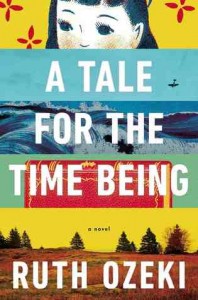 And speaking of Mindful Reading, I am totally enthralled by Ruth Ozeki’s A Tale for the Time Being, which a friend recommended and now I can’t put down! (Thanks, Judy D.)
And speaking of Mindful Reading, I am totally enthralled by Ruth Ozeki’s A Tale for the Time Being, which a friend recommended and now I can’t put down! (Thanks, Judy D.)
The story…which is really several stories (or maybe not)…is wonderfully complicated and includes a novelist (also named Ruth) who finds a Hello Kitty lunchbox washed up on the shore of the island in Canada where she lives with her odd-but-endearing eco-artist husband and a cat named Schoedinger (nicknamed Pesto)….and finds inside the lunchbox a packet of letters written in Japanese, a broken watch and the diary of a teenager in Tokyo who seems to be planing to commit suicide, but in the mean time is writing about her 104-year-old grandmother, who is a Zen priest….
I can’t do the narrative justice, but you get the picture.
Here’s from the opening of Part I:
An ancient buddha once said:
For the time being, standing on
the tallest mountaintop,
For the time being, moving on
the deepest ocean floor,
For the time being, a demon with
three heads and eight arms,
For the time being, the golden
sixteen-foot body of a buddha,
For the time being, a monk’s staff
or a master’s fly-swatter,
For the time being, a pillar or a lantern,
For the time being, any Dick or
Jane,
For the time being, the entire
earth and the boundless sky.
— Dogen Zenji, “For the Time Being”
Invisible Kingdoms
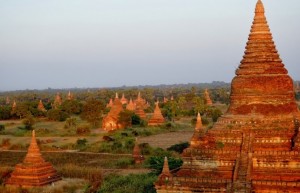
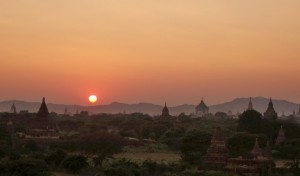 I brought my iPad with me on the trip, expecting mostly to use it for reading material on the plane, but I often turned to it during the trip, in the middle of the day, when it was too hot to be walking around outside. I would read little sections from Invisible Cities, by Italo Calvino, and every day I would get just a few paragraphs into the text and think…OMG, he’s writing about Burma! Here’s a sample:
I brought my iPad with me on the trip, expecting mostly to use it for reading material on the plane, but I often turned to it during the trip, in the middle of the day, when it was too hot to be walking around outside. I would read little sections from Invisible Cities, by Italo Calvino, and every day I would get just a few paragraphs into the text and think…OMG, he’s writing about Burma! Here’s a sample:
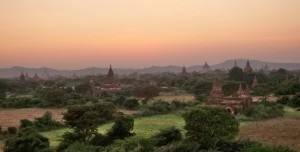 From the high balustrade of the palace the Great Khan watches his empire grow. First the line of the boundaries had expanded to embrace conquered territories, but the regiments’ advance encountered half-deserted regions, scrubby villages of huts, marshes, where the rice refused to sprout, emaciated peoples, dried rivers, reeds.
From the high balustrade of the palace the Great Khan watches his empire grow. First the line of the boundaries had expanded to embrace conquered territories, but the regiments’ advance encountered half-deserted regions, scrubby villages of huts, marshes, where the rice refused to sprout, emaciated peoples, dried rivers, reeds.
“My empire has grown too far toward the outside. It is time,” the Khan thought, “for it to grow within itself,” and he dreamed of pomegranate groves, the fruit so ripe it burst its skin, zebus browning on the spit and dripping fat, veins of metal surfacing in landslips with glistening nuggets.
Now many season of abundance have filled the granaries. The rivers in flood have borne forests of beams to support the bronze roofs of temples and palaces. Caravans of slaves have shifted mountains of serpentine marble across the continent. The Great Khan contemplates an empire covered with cities that weigh upon the earth and upon mankind, crammed with wealth and traffic, overladen with ornaments and offices, complicated with mechanisms and hierarchies, swollen, tense, ponderous.
“The empire is being crushed by its own weight,” Kublai thinks, and in his dreams now cities light as kites appear, pierced cities like laces, cities transparent as mosquito netting, cities like leaves’ veins, cities lined like a hand’s palm, filigree cities to be seen through their opaque and fictitious thickness.
“I shall tell you what I dreamed last night,” he says to Marco. “In the midst of a flat and yellow land, dotted with meteorites and erratic boulders, I saw from a distance the spires of a city rise, slender pinnacles, made in such away that the moon in her journey can rut now on one, now on another, or sway from the cables of the cranes.”
And Polo says, “The city of your dream is Lalage. Its inhabitants arrange these invitations to rest in the night sky so that the moon would grant everything in the city the power to grow ad grow endlessly.”
“There is something you do not know,” the Khan adds. “The grateful moon has granted the city of Lalage a rarer privilege: to grow in lightness.”
***
The photos above are of Bagan, taken from the top of one of the 2,000+ temples and pagodas still remaining from the Kingdom of Pagan, where from the 11th to 13th centuries, more than 10,000 temples were built.
Traveling Until Feb 6
 Assuming there are no new travel delays, I leave tomorrow morning for a month in Burma and won’t be back until February 6. (It will probably be a few days after that before I’m un-jetlagged and ready to start posting again.)
Assuming there are no new travel delays, I leave tomorrow morning for a month in Burma and won’t be back until February 6. (It will probably be a few days after that before I’m un-jetlagged and ready to start posting again.)
In my absence, I leave you with this selection from my favorite pre-travel reading: Invisible Cities, by Italo Calvino.
Kublai Khan does not necessarily believe everything Marco Polo says when he describes the cities visited on his expeditions, but the emperor of the Tartars does continue listening to the young Venetian with greater attention and curiosity than he shows any other messenger or explorer of his.
In the lives of emperors there is a moment which follows pride in the boundless extension of the territories we have conquered, and the melancholy and relief of knowing we shall soon give up any thought of knowing and understanding them.
There is a sense of emptiness that comes over us at evening, with the odor of the elephants after the rain and the sandalwood ashes growing cold in the braziers, a dizziness that makes rivers and mountains tremble on the fallow curves of the planispheres where they are portrayed, and rolls up, one after the other, the dispatches announcing to us the collapse of the last enemy troops, from defeat to defeat, and flakes the wax of the seals of obscure kings who beseech our armies’ protection, offering in exchange annual tributes of precious metals, tanned hides, and tortoise shell.
It is the desperate moment when we discover that this empire, which had seemed to us the sum of all wonders, is an endless, formless ruin, that corruption’s gangrene has spread too far to be healed by our scepter, that the triumph over enemy sovereigns has made us the heir of their long undoing.
Only in Marco Polo’s accounts was Kublai Khan able to discern, through the walls and towers destined to crumble, the tracery of a pattern so subtle it could escape the termites’ gnawing.
The Trouser People
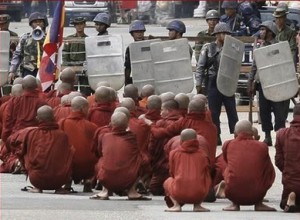 Now I’ve started reading The Trouser People: Burma in the Shadows of the Empire, by Andrew Marshall, and I can’t put it down.
Now I’ve started reading The Trouser People: Burma in the Shadows of the Empire, by Andrew Marshall, and I can’t put it down.
Here’s how it starts:
Philip the Miracle Monk rummaged at length in the mysterious folds of his orange robes and retrieved a trilling mobile phone.
‘Excuse me for a second,’ he apologized, but I was getting used to it. Philip’s robes had been ringing all morning.
Hairless, podgy and swaddled in robes, Philip reminded me at times of a very large, very bright baby. I had met him in Chiang Mai, in northern Thailand, soon after dawn, and it was immediately obvious that he was a highly unusual monk. For a start, most monks were not fanatical fans of the heavy-metal group The Scorpions–at least not as far as I knew. Monks weren’t usually called Philip either. His Buddhist holy name was as long as his arm, and was a bit of a mouthful for foreigners, so he had chosen an English name inspired by an electrical appliance.
‘I liked the sound of it,’ he told me. ‘It sounded very modern.’
Nor are monks supposed to know as much about troup movements as Philip seemed to: the Shan State Army, he whispered, had just dispatched 2,000 fighters to positions in north-east Burma. Not long ago, it was rumored, Philip had returned from Thailand’s frontier with Cambodia, where he had negotiated the release of a clandestine arms shipment from some overzealous border police. His heavenly powers of persuasion in such dealings had earned him the nickname ‘Miracle Monk’. Sometimes he was also called the Combat Buddha. Later on, in the jungle, I spotted him sitting with sculpted calm, his robes wrapped tightly around him, reading “Guns & Ammo” magazine.
From the Land of Green Ghosts
 I have just finished another of the wonderful books my teacher, Lila, recommended I read in preparation for going to Burma. (Reading list here.) This one, non-fiction, is called From the Land of Green Ghosts, in which the author–Pascal Khoo Thwe, a member of a tiny, remote tribe in the hills of Burma famous for their “giraffe-necked women”–recounts a chance meeting with a Cambridge don and the correspondence the two strike up, leading to Pascal’s rescue from the jungles where he has had to flee after opposing the corrupt military dictatorship and his subsequent admission to Cambridge where he receives a degree in English Literature!
I have just finished another of the wonderful books my teacher, Lila, recommended I read in preparation for going to Burma. (Reading list here.) This one, non-fiction, is called From the Land of Green Ghosts, in which the author–Pascal Khoo Thwe, a member of a tiny, remote tribe in the hills of Burma famous for their “giraffe-necked women”–recounts a chance meeting with a Cambridge don and the correspondence the two strike up, leading to Pascal’s rescue from the jungles where he has had to flee after opposing the corrupt military dictatorship and his subsequent admission to Cambridge where he receives a degree in English Literature!
Whew.
And on top of all that, the writing is gorgeous!
Here’s how the story begins:
‘My ancestors told me it was after the beginning,’ said my grandmother, Mu Tha, adjusting her head on the log she was using as a pillow. Her brass neck-rings gleamed in the candlelight. The rings were fourteen inches high and rose to her head as though they were supporting a pagoda stupa. Hanging from her ears and neck were several silver chains holding coins and charms. The holes in her earlobes were big enough to put a bottle cork in. We sat at her feet massaging her legs and shoulder as we listened to her story.
‘The male and female winds were blowing through space, but the female wind was pregnant and could not keep up with the male. The male wind circled her until she gave birth to a golden egg, from which emerged the goddess of creation with her children. Sitting on the empty shell of the egg, the goddess watched the faraway stars coming into existence. They appeared in the deep blue-black sky like tiny but brilliantly luminous red, white and yellow flowers, their petals falling to the ground in a gale, filling the firmament.’
That Monkey Brain Needs Love
Over the weekend, I listened to a wonderful series of talks by Rick Hanson called No-Self in the Brain, given at a recent day-long event at Spirit Rock. Rick is a neuropsychologist and a New York Times best-selling author, who wrote Buddha’s Brain, and now has a new book out called Hardwiring for Happiness: The New Brain Science of Contentment, Calm and Confidence.
 He talks about how we have evolved with different “layers” in our brain. The first — and most primitive — is what he calls the “Lizard Brain,” which is primarily concerned with being safe. This is the nervous, will-I-be-OK? part of the brain.
He talks about how we have evolved with different “layers” in our brain. The first — and most primitive — is what he calls the “Lizard Brain,” which is primarily concerned with being safe. This is the nervous, will-I-be-OK? part of the brain.
The next is the “Mouse Brain,” which is primarily concerned with finding and getting nourishment. This is the hungry, will-there-be-enough? part of the brain.
And the last is the “Monkey Brain,” which is primarily concerned with establishing and maintaining social connections. This is the needy, am-I-loved? part of the brain.
We all have each of these, of course, but many of us have one that tends to be more easily triggered. In the talks (and I assume, in his book), Rick offers ways — in mediation — that we can relax and soothe these different parts of the brain.
The “Lizard Brain” can be soothed by noticing–and then staying with–those time when we feel a sense of safety and confidence.
The “Mouse Brain” can be soothed by noticing/staying with those time when we feel a sense of sufficiency and contentment.
And the “Monkey Brain,” (which seems to be my personal favorite) can be soothed by noticing/staying with those time we we feel a sense of loving and being loved.
Dancing with Happiness
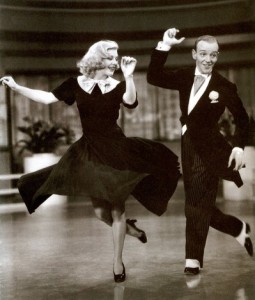 The Dancing with Life discussion group met last night. We’re on the final chapter: “The Courage to be Happy.” Kind of a strange idea, isn’t it…that it might take courage to let ourselves be happy?
The Dancing with Life discussion group met last night. We’re on the final chapter: “The Courage to be Happy.” Kind of a strange idea, isn’t it…that it might take courage to let ourselves be happy?
Phillip writes: “You may already be telling yourself that you certainly are not afraid of your happiness. You might be right, but I suggest that you pay more attention to how you handle your moments of happiness before reaching such a conclusion. In my observation ambivalence, defensiveness, and even aversion towards happiness is quite pervasive. Even among people who talk about wanting to be happy, there is a tendency to distance themselves and take their actual felt experience of happiness for granted.
“There are many reasons for this unease. First of all, you might feel guilty that your life is going well when there is so much disease, poverty, inequality, and oppression in the world. You might also be superstitious, fearing that if you open to happiness you will jinx it, or that it will attract envy, or that someone will try to take it from you…
“You may be afraid to open to joy and well-being because receiving joy requires being vulnerable and fully present; therefore, losing the happiness or even the thought of losing it can seem devastating to you…
“Your times of happiness and joy are just as valuable, just as authentic, and posses just as much potential for insight as your difficult moments. As with dukkha (suffering), you are called upon to have courage in order to be fully present in those moments of well-being. You are to feel them fully in your body, to know the quality of the mind when well-being manifests, and to learn the nature of this worldly existence as revealed by your sukha (happiness)….
“Ask yourself, are you genuinely staying mindful during your times of sukha in this manner? Do most of your moments of sukha even register in your awareness, or are you taking them as a given and looking ahead for the next fulfillment? Do you have a habit of acknowledging sukha, appreciating the feeling of well-being, and cultivating gratitude for it?
“Sometimes students resist my instructions to be mindful of their sukha moments because they mistakenly believe that if they bring mindfulness to their joy it will disappear!…Your happiness will not be diminished by becoming fully present with it; it will be enhanced….”
